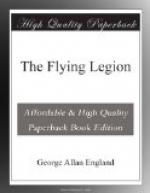The main corridor, like the other, was flanked by doors. Two or three stood open, giving glimpses of comfortable staterooms. The men’s footfalls sounded with softened tread on a strip of thick, brown carpet that made pleasant contrast with the gleaming white walls. Light from frosted glass circles, flush with walls and ceiling, made the corridor bright as day.
The Master walked with the confident precision of one who already had passed that way a score of times. He opened the third door on the left—it slid into the wall, instead of swinging, thus economizing space—and all entered what was obviously the main saloon of the giant plane.
This saloon measured seventeen feet six inches, from corridor to windows, and twenty-nine fore-and-aft. It was furnished with a center-table, book-cases, easy-chairs, two commodious sofa-lockers, and had an excellent carpet. Bohannan noted a Victrola, with many records.
Like all parts of the ship, its lighting was splendid. Well-curtained windows gave it a homelike air. At first glance, one would have thought oneself in a rather luxurious private house; but second inspection showed all possible construction and furnishings were of aluminum alloy, of patterns designed to cut weight to the lowest minimum.
The walls bore lightly framed photographs of men famous in the annals of flying, from Santos-Dumont and the Wrights to Gruynemer and Nosworthy; also pictures of famous machines—the Spad, Bristol Fighter, Sopwith Pup, 120-135, and others. More conspicuous than any of these was a framed copy of the International Air Commission’s latest condensed rules.
Signs of recent occupancy were not wanting. An extinct cigar lay on the carpet, where it had fallen from the mouth of some airman swiftly overtaken by sleep. The table bore an open cigar-box, several packs of cigarettes with loose “fags” scattered round, and a number of champagne bottles.
Two of these were opened; one had been emptied. The other had lost part of its contents. Several champagne glasses stood on the table, and one lay on its side, where perhaps a falling hand had overset it. In one of the glasses, a few last, vagrant little bubbles were still rising from the tall, hollow stem.
“Hm!” grunted the Master contemptuously. “Fools! Well—there’ll be no alcohol aboard this craft!” He loosened the buckles of his rucksack, and cast the burden on one of the sofa-lockers. The others did as much.
“Shall we stow the gear in our cabins?” asked Bohannan, gesturing at the doors that led off the saloon.
“Not yet,” answered the Master, glancing at the chronometer that hung beside the air-rules. “Time enough to get settled, later. Every second counts, now. We’re due to start in seven minutes, you know. Rrisa will attend to all this. We three have got to be getting forward to the pilot-house.”
Bohannan nodded.
“Let’s have some air in here, anyhow,” said he, turning toward one of the windows. “This place is damned hot!”




